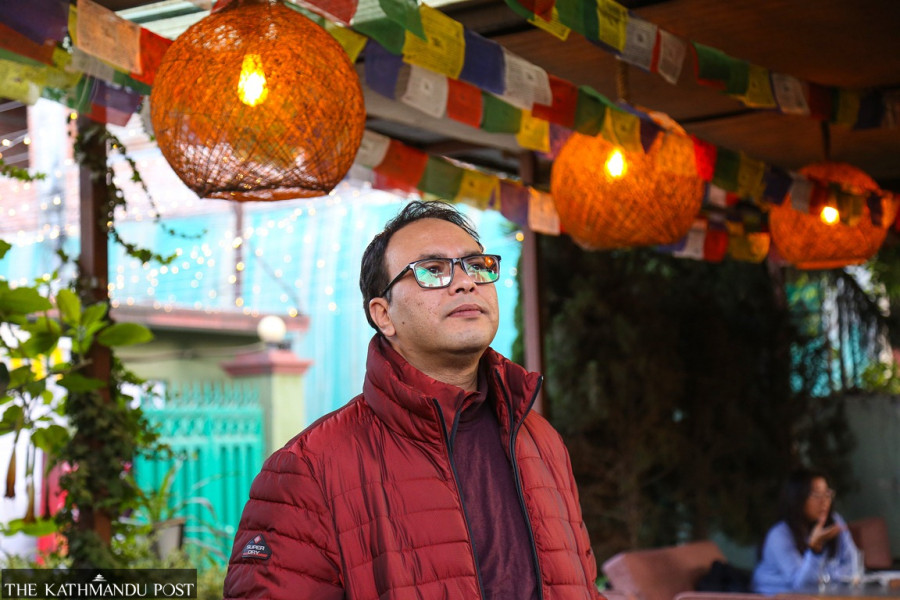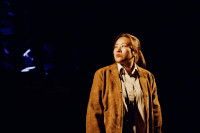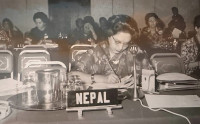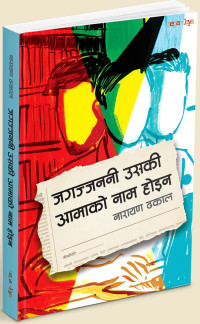Culture & Lifestyle
‘All my writings have contained a piece of me’
Acclaimed scriptwriter Abinash Bikram Shah on his writing process, his early filmmaking inspirations, and his views on how Nepal’s filmmaking landscape is changing.
Shranup Tandukar
Abinash Bikram Shah has been a writer in renowned Nepali films like ‘Kalo Pothi’, ‘Highway’ and ‘Tattini’, all of which have premiered in national and international film festivals. In 2015, he even strayed away from the film industry to work as a lead writer for the ‘Singha Durbar’ TV series. Currently, he is working to direct his first feature film slated to begin production in 2022.
From a very young age, Shah loved watching films. “I used to get regular scoldings at home for spending all my time watching movies,” says Shah.
With over a decade of experience in the filmmaking industry, Shah also teaches scriptwriting courses to potential filmmakers at Oscar International College. Shah sat down with the Post’s Shranup Tandukar to talk about his filmmaking journey, the process of scriptwriting, and views on the Nepali filmmaking scene. Excerpts:
What was your childhood like? Were there any film fanatics in your family who instilled a love of films in you?
No one in my family was involved in the film industry; most of them were in government jobs. Staying alone in my house, I naturally spent a lot of time watching TV and fell in love with films from an early age of my own volition. However, we didn’t have a VCR player at home, so I watched what came on TV. I used to watch the ‘Doordarshan’ channel, and on Fridays, the channel would broadcast films that were a bit different from mainstream movies. I remember watching a film called ‘Rudaali’ on that channel. A song from the film ['Dil Hoom Hoom Kare'] was shot in an interesting way which is still imprinted on my mind. At that time, most of the films dealt with class conflict—between rich and poor. In that song, there is a prominent use of shadows: a female chases and tries to touch the shadow of her beloved, who is from a higher class. I was so captivated by this technique that I tried to use it in one of my short films called ‘Horn Please’.
After the age of DVDs came, there was a complete shift in how I perceived films. My film landscape was no longer limited to Bollywood or Hollywood. I could watch Mexican, Iranian, Chinese, and Korean films. In Hollywood and Bollywood, the movies followed the mainstream structure or ‘three-act structure’, but films from other countries experimented and made me realise that films didn’t need to be restricted to a particular structure.
And what about Nepali films? Did you use to watch them, too?
I used to watch the classics like ‘Chino’ and other Tulsi Ghimire productions, but once I reached my teenage years, I rarely watched Nepali films—they were like badly-copied Bollywood films. Nepali films always were bound by the same-old theme of class conflict, which didn’t interest or excite me. I didn’t feel represented watching them. But foreign films like ‘Y Tu Mama Tambien’ resonated with me.
How has your childhood and personal experiences shaped your filmmaking career, especially your writing?
I actually didn’t realise it at first, but unknowingly, all my writings have contained a piece of me. I think it is the same with all the creators: all of us create something to say something,
I really liked editing and writing from the start; they were like my first love. I used to be shy and couldn’t properly express myself to people. So, I felt comfortable staying behind closed doors writing and editing. Writing is a lonely process, and many people are scared of facing their true selves. When you write something, you are writing about yourself. If I write about a character who kills someone, I am writing about my own thoughts. Maybe I will never act on these thoughts, but I need to face them to write about them. Writing is about how far you can go into the dark and write about all things you discover. People who do not come face-to-face with themselves write things that simply feel hollow.
I have learned from all my experiences that other people have already written about all things except your personal experiences. That is the one thing that you can authentically share.
Could you take us through your writing process?
First of all, I think of what I need to write about. Currently, I am working on a script about a breast cancer survivor. My cousin passed away due to breast cancer, so I wanted to share her story. An idea needs to come along like this, but you shouldn’t directly jump into writing the script. You need to first map out the beginning, middle, and ending—what should the story be about. Then I write the synopsis, treatment (a summary of the story idea), and step-outline, which describes scenes in one to two lines. The story grows and matures along with each aspect. While writing the treatment, I go about my usual life: I go out with my friends while I continue to process and work on the treatment in the back of my mind. But while writing the script, I stay behind closed doors. It usually takes me around three to five weeks to write a first draft of the script, but the process before writing the script can take me anywhere from a week to years.
After finishing a script, I prefer going to script labs, which are contests where you can submit your script to veteran scriptwriters and mentors, and if you are selected, you spend around a year rewriting your script. You incorporate their feedback and suggestions. After all this, the script gets more or less finalised.
You have experience in different aspects of filmmaking. Do you think the director and editor should be the same person?
Personally, I think doing so can cause problems. If a director and editor are the same people, the script might not get that external perspective and reach the next level.
Sometimes, we convince ourselves that a scene or a shot is necessary just because we wrote it and think that it is pivotal to the plot, but when an outsider comes along with an external perspective, they may see that the scene or plot isn’t as important as we think it to be. Of course, you can do an initial edit by yourself, but the final edit should be reserved for an external editor.
Films from different countries have their particular film-philosophy. Do you think Nepali films have also cemented their own identity?
A film is an expression of freedom. For example, the film recently premiered at kimff by Pooja Gurung and Bhibhusan Basnet [‘The Big Headed Boy, Shamans and Samurais’]. It broke free from the traditional structure and pushed the boundaries. A traditional film bound by a three-act structure and conventional protagonists isn’t the only type of film. Films in different countries such as Mexico, Cuba, France, Germany, etc., are so dissimilar to the conventional norms of filmmaking. In Nepal, however, that different approach to filmmaking isn’t visible in the mainstream aspect.
One reason we haven’t been able to find our own voice is that we may hesitate to experiment and prefer sticking to what works. That is also understandable, as filmmaking is a costly endeavour. However, the future is looking brighter as people who have secured foreign funds are now experimenting with films.
Scriptwriters, sound designers, colourists, and other professionals behind the scenes usually don’t get as much recognition as directors do. How do you feel about this?
I think that directors being at the forefront is logical, but it’s still a shame because a film takes so much collective effort that audiences never get a chance to see and appreciate it. For example, a sound designer is one of the most important people while making a film because a film is 50 percent what you see and 50 percent what you hear, but rarely do you see sound designers being celebrated and recognised for their efforts. And, of course, a script is literally the backbone of a film.
In the context of Nepal, maybe this trend has been exacerbated because almost all the people who come into filmmaking do so against their family's wishes. Even in my home, I had to listen to many criticisms and discouragement when I went into filmmaking. Parents still think that mainstream jobs such as doctors, engineers, managers will be beneficial for their children. So, people who try to pursue a career in filmmaking may feel the need to become directors or cinematographers so that their names will come at the forefront and show their successes more prominently.
Most dialogues in Nepali films sound superficial. Why do you think we have not been able to write good dialogues? In your opinion, how can good dialogues make a film better?
I think that most people don’t realise that dialogues aren’t conversations. A dialogue needs to have meaning and push the plot forward. In Nepal, many dialogues are written just for the sake of it. People should first ask what type of dialogue is needed in a particular scene. First, you need to ask if a scene even needs a dialogue keeping in mind the scene's purpose. If your film has a conversational tone like the trilogy by Richard Linklater, then you can add a lot of dialogues, but if your film isn’t going in that direction, you need to evaluate if dialogues are needed.




 21.24°C Kathmandu
21.24°C Kathmandu















